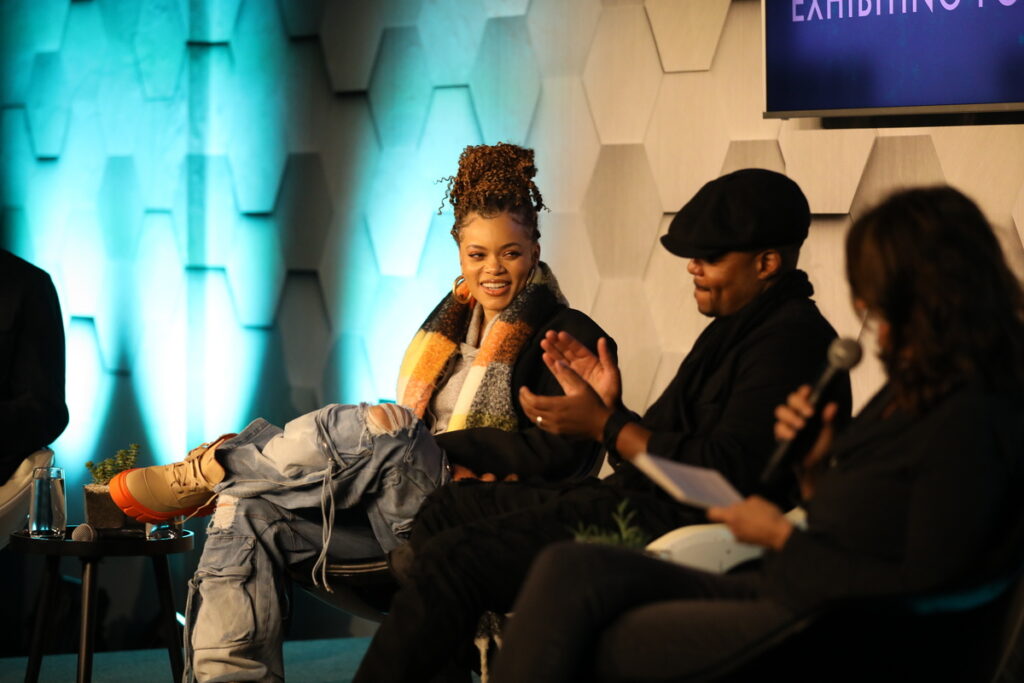By Veronika Lee Claghorn
Director Titus Kaphar reveals to Tracy McKnight (VP, Creative, Film, TV & Visual Media for BMI) at a panel on January 22 at the 2024 Sundance Film Festival that he has a very unique process for screenwriting. He dictates his script into his phone while sitting in a hot tub, which is how he parsed out his first feature film, Exhibiting Forgiveness.
“I’m telling you,” says Kaphar. “It’s the best investment I’ve ever had for me and my wife.”
Kaphar, who grew up playing bass but primarily focused on painting as his artistic medium, was sitting in those warm bubbles, thinking of how important music was to be for his vision of making his first feature film. While he had many options of famous composers to choose from, he wanted to go with a person he connected with personally and felt deserved the opportunity. Enter Jherek Bischoff, a composer, arranger, and multi-instrumentalist who has worked with artists like Kassa Overall and Regina Spektor. The musician had just relocated to Los Angeles, and it appears the stars aligned. He had been working in music production and theater but wanted to enter the movie world, a place where musicians with synesthesia-esque tendencies like to go to put visuals to their sounds.
Bischoff was also offered the opportunity to record with Andra Day, the Grammy award-winning singer-songwriter and actress, who was cast as the lead. “As a [record producer] it’s not every day you get to record a vocalist who can sing like Andra.”
Day smiles at the praise from not only Bischoff, but Kaphar as well, and says that this new role was pleasant and coming from a place of peace, versus when she made her acting debut in The United States vs. Billie Holiday. Kaphar jumps in to express his admiration for the way in which Day crafted her songs for the film.
“When I began this project, I knew music was going to be more than a background thing. The character Andra plays is a musician, and we walked through her process as she creates a very specific song for the film,” explains Kaphar. Day even learned to play the guitar for a special scene between her and co-star Andrė Holland. As the production team and actors were filming, Day was up at 3 a.m. recording vocal takes for her songs. Day claims it’s her ADHD that causes her to work this way. Meanwhile, Bischoff was literally orchestrating behind the scenes.
From day one, Kaphar, as a painter, expressed that “texture” was extremely important to his vision, and so Bischoff decided to seek out “a couple really great pianos.” “We used a lot of bass and felted pianos,” explains the musician to the audience and host, McKnight. “A felted piano is putting a piece of felt between the hammer and strings of a piano which is very soft. If you put a mic very close to it, you don’t hear a classic piano sound; the piano gets very quiet and all the mechanics of the piano are magnified.”
Day, who sang several bars of her latest single “Where Do We Go,” expresses gratitude for the opportunity Kaphar has given to her, and the two exchange friendly banter. The director tells the panelgoers to see Day perform at Super Bowl LVIII — his enthusiasm for one of his leads is contagious. Bischoff, however, has a sentimental moment. Through tears, he marvels at the opportunity and experience Kaphar afforded him.
“To be invited to help tell his story [of trauma]…,” he starts, then pauses. “He has been so encouraging and celebrated me throughout the process. Just to be invited and celebrated by this genius is unbelievable.” Appearing ever the big brother, empathic type, the director gets up and gives the composer a huge hug.
If that isn’t sweet harmony, what is?
To see more Sundance Beyond Film panels, click here.

































